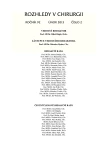Chest wall haemorrhage as a complication of anticoagulation treatment – a case study
Authors:
L. Bébarová 1; T. Řezáč 1; Dušan Klos 1
; M. Šimek 2; Č. Neoral 1
Authors‘ workplace:
I. chirurgická klinika LF UP a FN Olomouc, přednosta: doc. MUDr. Č. Neoral, CSc.
1; Kardiochirurgická klinika LF UP a FN Olomouc, přednosta: Doc. MUDr. V. Lonský, Ph. D.
2
Published in:
Rozhl. Chir., 2013, roč. 92, č. 2, s. 95-97.
Category:
Case Reports
Overview
Low-molecular-weight heparins (LMWH) are a class of medication used as an anticoagulant. They belong amongst the so called direct anticoagulants. The effect on the coagulation cascade is mediated through the inactivation of anti-factor Xa. They are used in prophylaxis of thrombosis because of their lack of fibrinolytic effect. If the dosage is adequate, the effect on the bleeding time is minimal and thus monitoring is not necessary unlike in case of direct anticoagulants. Nevertheless, the monitoring is advisable in patients with renal insufficiency in whom the renal elimination of LMWH and their metabolites is reduced, hence they can cumulate in the organism and increase the risk of various bleeding complications.
We present a case study of an 83-year-old patient with a massive subcutaneous haematoma caused by the cumulation of LMWH and with the subsequent huge defect of the chest wall treated with negative wound pressure therapy (Vacuum Assisted Closure – V.A.C.)
Key words:
low-molecular – weight heparin – renal insufficiency – bleeding – antiXa – negative pressure wound therapy
Sources
1. Malý J. Nízkomolekulární hepariny. Remedia 2008;18 : 148–154.
2. Stryja J. Moderní postupy v léčbě nehojících se ran. Remedia 2010;20 : 180–184.
3. Hoffmann P, Keller F. Increased major bleeding risk in patients with kidney dysfunction receiving enoxaparin: a meta-analysis. Eur J Clin Pharmacol 2012;68(5):757–65.
4. Lim W, Dentali F, Eikelboom JW, Crowther MA.Meta-analysis: low-molecular-weight heparin and bleeding in patients with severe renal insufficiency. Ann Intern Med 2006;144(9):673–84.
5. Clark NP. Low-molecular-weight heparin use in the obese, elderly, and in renal insufficiency. Thromb Res 2008;123 Suppl 1:S58–61.
6. Lim W. Low-molecular-weight heparin in patients with chronic renal insufficiency. Intern Emerg Med 2008;3(4):319–23.
7. Nutescu EA, Spinler SA, Wittkowsky A, Dager WE. Low-molecular-weight heparins in renal impairment and obesity: available evidence and clinical practice recommendations across medical and surgical settings. Ann Pharmacother 2009;43(6): 1064-83.
8. Eisenstein DH. Anticoagulation management in the ambulatory surgical setting. AORN J 2012;95(4):510–21.
9. Bonar RA, Favaloro EJ, Marsden K. External quality assurance for heparin monitoring. Semin Thromb Hemost 2012;38(6): 632–9.
10. Beitz JM, van Rijswijk L. Content Validation of algorithms to guide negative Pressure wound therapy in adults with acute or Chronic wounds:a Cross-sectional study. Ostomy Wound Manage 2012;58(9):32–40.
11. Roberts DJ, at al. Negative-pressure wound therapy for critically ill adults with open abdominal wounds: A systematic review. J Trauma Acute Care Surg 2012;73(3):629–639.
12. Yamasaki O, Nagao Y, Sugiyama N, Otsuka M, Iwatsuki K. Surgical management of axillary necrotizing fasciitis: a case report. J Dermatol 2012;39(3):309–11.
13. Martindell D. The safe use of negative-pressure wound therapy. Am J Nurs 2012;112(6):59–63.
Labels
Surgery Orthopaedics Trauma surgeryArticle was published in
Perspectives in Surgery

2013 Issue 2
- Possibilities of Using Metamizole in the Treatment of Acute Primary Headaches
- Metamizole at a Glance and in Practice – Effective Non-Opioid Analgesic for All Ages
- Metamizole vs. Tramadol in Postoperative Analgesia
-
All articles in this issue
- Pancreatic fistula – definition, risk factors and treatment options
- The benefit of the da Vinci robotic system in abdominal oncosurgery – our preliminary results
- Laparoscopic repair of incisional hernias – our first experience
- Chest wall haemorrhage as a complication of anticoagulation treatment – a case study
- Bilateral perinatal torsion of spermatic cord – a case report and literature review
- Perspectives in Surgery
- Journal archive
- Current issue
- About the journal
Most read in this issue
- Pancreatic fistula – definition, risk factors and treatment options
- Bilateral perinatal torsion of spermatic cord – a case report and literature review
- Laparoscopic repair of incisional hernias – our first experience
- Chest wall haemorrhage as a complication of anticoagulation treatment – a case study
